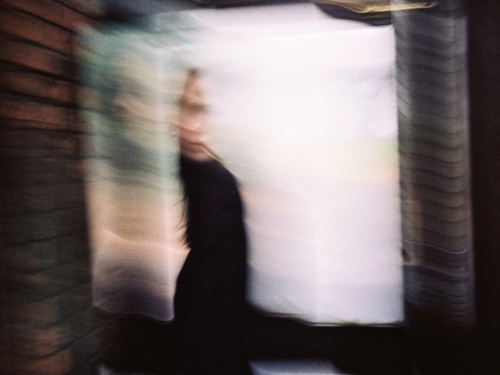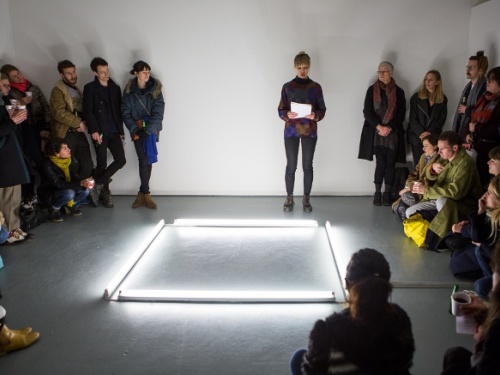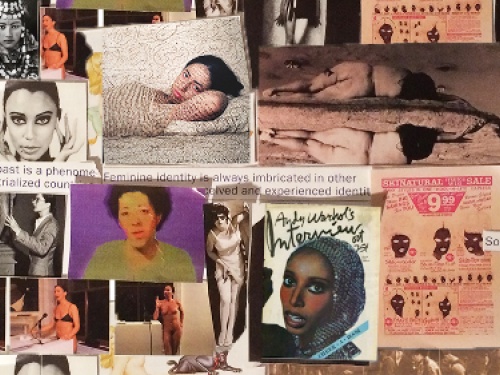Poetry and Performance: An Interview with Kayo Chingonyi
To coincide with Kayo Chingonyi's Associate Poet residency at the ICA, Maya Caspari caught up with him to discuss his influences, the relationship between language and race, and the significance of music in his work.
What first inspired you to write? You won the Poetry Society’s Rise Youth Slam Championship in 2003. How has your work evolved since?
I was inspired to write as an extension of reading and also watching cartoons. The fantastical worlds of those books and programmes made me want to create imaginative worlds of my own. For some reason I was concious early on that the books I read and shows I watched had been written by someone. For a while I wanted to be a cartoonist but had no talent or patience for it. Writing has always been something I can do in a way that drawing is not so I started writing stories and it spiralled from there.
"The interplay between speaking and writing is at the heart of what I do."
When I won the Poetry Society competition my experience of poetry, both in print and performance, was limited. Winning that competition led to my becoming a part of the poetry scene in London which in turn spurred me on to read more poetry. In that sense, performance and print have been in tandem for a number of years in my work whereas when I started out they were separate. The main difference in my work between 2003 and now, then, is that now I am more conscious of bringing my disparate influences together when I write and back then I wrote some poems for performance and some for publication.
Your ICA event Poetry and Sound, featured performances by poets who use the sounds of words and their textures to inform their work. How do you see the role of live performance? Is it important to you that your poems are heard and not only read?
When I read something I hear a voice in my head reading the words aloud, so it's all auditory for me. I'm concious that it might not be like that for everybody. When you read a poem and it moves you, that is a live performance, just as listening to someone read a poem is a live performance. They are just different kinds of performance. In my work they are complementary but some poets think of print as the best mode of reception for poems. I'm inclined to disagree since I have always been most moved by poems at the level of sound first before looking at their propositional content. If a poem has a brilliant sense of narrative but it sounds bland, I am never going to enjoy it as much as a poem written by someone who has thought about how the thing sounds as a way of telling a story. So, yes, this interplay between speaking and writing is at the heart of what I do.
In your poem The Room, you include the line "when you sample you’re not just picking up that sound, you’re picking up the room it was recorded in." Could you tell us a bit more how you see the relationship between music and your poetry? Do you consciously enact a form of ‘sampling’ in terms of your various allusions to, and use of, music as well as other poets’ and writers’ work?
That is a quote from one of my favourite musicians, Oddisee. I think music is one of the reasons I write poetry at all. I started off writing stories, then I wrote lyrics, then I wrote poetry. The first bits of writing by someone else that I memorized were the lyrics to Buffalo Soldier.
"Music is one of the reasons I write poetry at all."
For me, the music and poetry are wrapped up in each other. My fascination with song lyrics is the same that comes out when I enjoy a poem but with poetry the music is implied because there is no instrumentation behind the words. I don't conciously sample in my work but lyrics or bits of what other people have written or said come up often when I'm speaking or thinking so it makes sense that they are in my poems. When I'm editing I leave some of these things in because they make the poems more personal even if they are not based on things that have happened in my life.
In calling a spade a spade you use the epigraph from Thomas Sayers Ellis "I no longer write white/while writing/yet white writing/won’t stop writing me." The poem seems to resist reductive categories of identification or being ‘written’ into any one-dimensional political reading. In what ways does your understanding of the politically and historically charged relationship between language and race inform your work?
Language is such an important part of how we are identified from without and our understanding of race is part of that vast system. I do engage with a lot of writing concerning race in my work because there is still a lot to be done, in this country particularly, so that the subtle means by which structural racism persists are made manifest.
"I want to chip away at the notion that whiteness is the normative unmediated position from which all other subjectivities deviate."
I don't think it's neccesarily the job of the poet to do this but it is certainly part of why I write poems, to chip away at the notion that whiteness is the normative unmediated position from which all other subjectivities deviate.
Which other poets, past and present, influence you? Do you feel that the way poetry is perceived and published has changed in recent years?
In my teens Douglas Dunn and T. S. Eliot were really important alongside Nas, Jehst, Chester P and a number of other emcees. Of late Michael Donaghy, Alice Oswald, Kei Miller, Anthony Joseph, and Valzhyna Mort have been particularly important to my work.
"Lately some spaces have opened up for poets who do experimental work to be heard and appreciated by a wider audience."
I think lately some spaces have opened up for poets who do experimental work to be heard and appreciated by a wider audience. Also, I feel that the online world has changed our perceptions of an audience for poetry. Hopefully in years to come the factions that still exist in poetry will interact even more. ■
The Poetics of Grime takes place on 16 March, as part of Kayo Chingonyi's Associate Poet Residency. As a response to the growing intersection between art and poetry today, the Associate Poet programme continues a long-standing interest and engagement with language and poetry throughout the ICA’s history.
This article is posted in: Blog, Events, Interviews, Music
Tagged with: Kayo Chingonyi, Associate Poet, poetry, interview, Poetry and Sound, Literature, Music, Fiction, The Poetics of Grime, Maya Caspari







